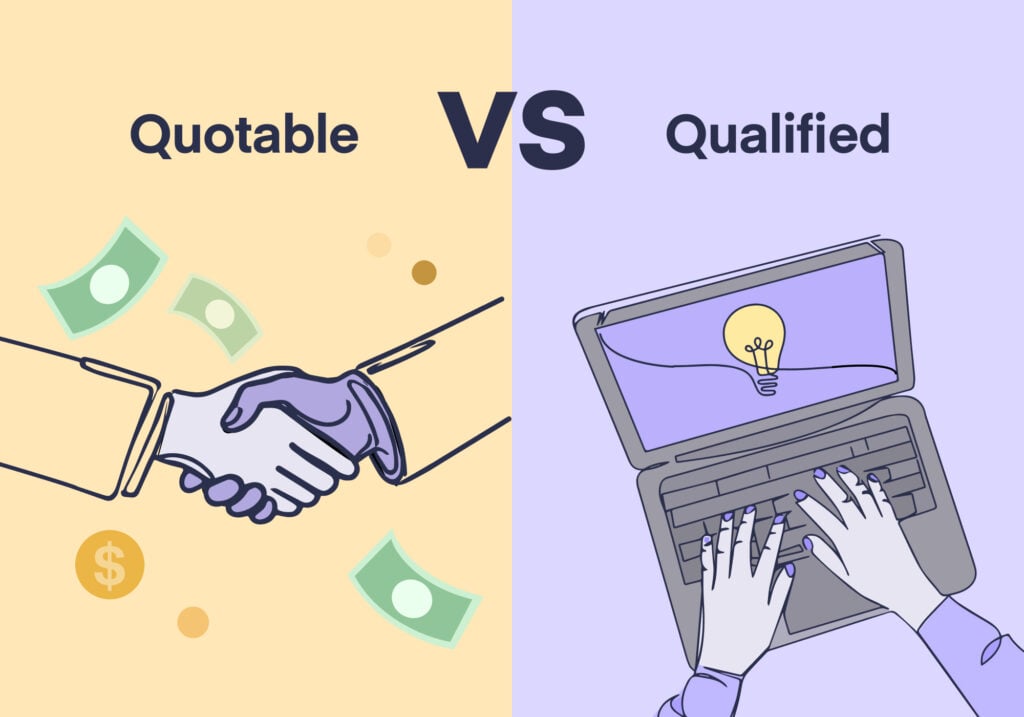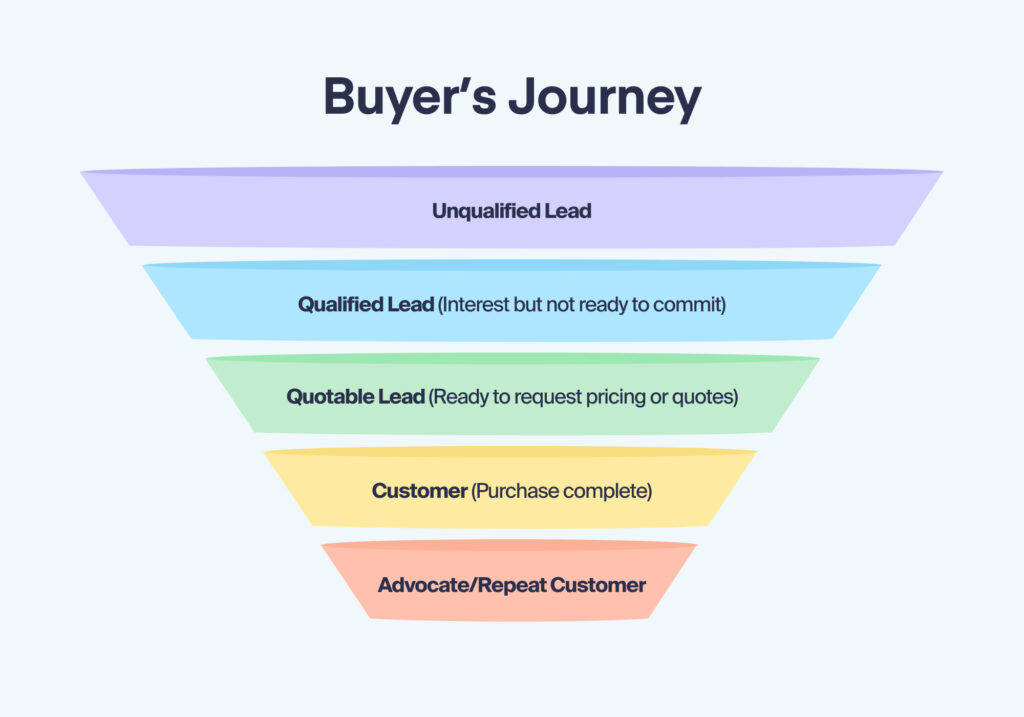
What’s the difference between a qualified and quotable lead? If you’re feeling a bit confused right now, you’re not alone. Plenty of other marketers use the terms interchangeably. However, learning to focus your campaigns on one and not the other is key to unlocking more value from your budget and growing your ROI.
That’s why today we’re looking at what makes these two terms so different. And most importantly, why understanding that difference matters to marketers like you.
Diffrence Between Qualified & Quotable Leads
Here’s a quick breakdown of the similarities and differences between these terms. We’ll discuss these points in more detail below.
| Qualified Lead | Quotable Lead | Why It Matters | |
| Qualification Level | Somewhat Qualified – Gone through initial vetting, may fit | Highly Qualified – Clear need and readiness for a quote | Quotable leads eliminate ambiguity, saving time for sales teams. |
| Sales Readiness | May require further nurturing | Sales-ready (ready to be quoted) | Focuses efforts on leads most likely to convert. |
| Criteria Examples | - Downloaded an eBook - Signed up for a newsletter - Requested general information | - Booked an appointment - Asked for a custom quote - Contacted sales directly | Indicates clear intent and value, differentiating casual interest from genuine buying signals. |
| Value | Moderate (semi-likely to become a customer) | High (likely to become a customer) | Prioritizing high-value leads improves marketing ROI. |
| Industry-Specific Examples | Home Services: Requested a price list Medical Services: Signed up for updates on services | Home Services: Scheduled a consultation Medical Services: Booked a new patient appointment | Demonstrates how quotable leads align with the unique sales cycles of different industries. |
| Key Takeaway | Broader category with varying levels of interest and intent | Clear, measurable, and actionable leads for marketing and sales alignment | Focusing on quotable leads ensures resources are directed at those with immediate conversion potential, enhancing efficiency and revenue generation. |
Let’s take a closer look at the definition of these lead types as well as some examples of each.
What Is a Qualified Lead?
A qualified lead is a potential customer who’s met a bit of initial criteria (maybe they’re in your service area) and shown interest in your business’s services. That said, they’re not quite ready to make a purchase or book an appointment.
Maybe they’ve:
- Downloaded an ebook
- Signed up for your newsletter
- Requested a list of services
Now, all these actions are great—they’re obviously engaging with your business. But they don’t really say “I’m ready to buy”. As a result, they may need more nurturing through emails, content marketing, or follow-up outreach first.
Example:
A marketing agency might consider a lead to be qualified if they plug in their email address for a free guide on advertising strategies. There’s interest there, but that action alone doesn’t guarantee they’re ready to talk to sales or make a purchase.
What Is a Quotable Lead?
A quotable lead, on the other hand, is ready to make a purchase decision. They’re highly qualified, want to talk with sales, and are looking for a quote for services. There’s more than just interest here—there’s intent to buy.
Some actions that point to a quotable lead are:
- Booking an appointment
- Asking for a detailed quote
- Contacting sales directly
Put simply, quotable leads are ready to be quoted. And they’re the most valuable leads out there.
Example:
An HVAC company might receive a lead through a form requesting a specific quote for air conditioning repair. The lead has already been vetted, meets the service area criteria, and is actively looking for a service provider.
Qualified vs. Quotable Leads: Which Is the Best Measure of Marketing Success?

By focusing on quotable leads, businesses can align their marketing and sales efforts around opportunities with the highest potential to convert, improving overall efficiency and effectiveness.
Benefits for Sales Teams
- Higher Conversion Rates: Sales teams close deals more often when engaging with quotable leads due to their readiness to buy.
- Shorter Sales Cycles: Since quotable leads are sales-ready, the process of moving them from inquiry to purchase takes significantly less time.
- Streamlined Sales Effort: With less need for education or persuasion, sales teams can focus on meeting customer needs and closing deals.
Benefits for Marketing Teams
- Clearer ROI: By focusing on leads with a higher likelihood to convert, marketing teams can directly measure the impact of their efforts on revenue.
- Improved Resource Allocation: Data-driven insights make it easier to prioritize high-performing campaigns and allocate budgets effectively.
- Better Campaign Optimization: With clear feedback on which campaigns generate quotable leads, marketing strategies can be refined and scaled with greater confidence.
By prioritizing quotable leads, marketing and sales teams can maximize their impact, ensuring that their time and resources are spent where they matter most—on prospects who are ready to become customers.
Quotable Lead Qualification Criteria
Below are some examples of criteria you can use to determine if a lead is quotable or not. Examples are broken down by industry. You’ll also find a quick walkthrough of how to qualify, categorize, and value these leads in WhatConverts.
Home Services Business (HVAC, Plumbing, Lawncare, etc.)
| Who Qualifies | The Agency |
| When They Qualify | Daily (Recommended) |
| Quotable Criteria | Interested in an offered service + Reside in service area |
Lead Qualification Process
- Switch to Qualifier View.
- Qualify call leads with Lead Analysis and forms with Mapped Fields or form field data.
- Mark lead as quotable or not.
- Use Lead Details page to fill out Custom Fields. If quotable, input the requested service ("sprinkler installation"). If non-quotable, input the reason why ("out of service area").
- Add Quote or Sales Value based on Custom Fields. E.g., if “Requested Service” is "sprinkler installation", Quote Value is $3,000, etc.
Medical Services (Dentistry, Ophthalmology, Veterinary Clinics, etc.)
| Who Qualifies | The Client |
| When They Qualify | Live (on the call) |
| Quotable Criteria | New patient + Books an appointment |
Lead Qualification Process
- Switch to Qualifier View.
- Answer call.
- Ask questions to qualify the lead and mark Custom Fields appropriately.
- Mark lead as quotable or not based on criteria.
- Use Lead Details page to fill out Custom Fields. If quotable, input the requested service ("crown replacement"). If non-quotable, input the reason why ("existing patient").
- Add Quote or Sales Value based on Custom Fields. E.g., if “Requested Service” is "crown replacement", Quote Value is $1,200, etc.
Professional Services (Law Firms, Real Estate, Finance, etc.)
| Who Qualifies | The Client + The Agency |
| When They Qualify | Daily |
| Quotable Criteria | Not spam + Responded when contacted |
Lead Qualification Process
This section is handled by the client.
- Use the Sales Inbox View to sort by which leads need to be followed up on.
- Mark spam leads in Notes. Look for red flags like legitimate email address and name. If spam, leave “Invalid - Spam” in Notes and mark as Not Quotable.
- Contact legitimate lead. If they respond – say “contact made” in Note. If they don’t respond – say “no response” in Notes.
- Add notes about requested service.
- Mark lead as quotable or not.
This section is handled by the agency.
- Use the Qualifier View.
- Use sales rep notes to fill out Custom Fields: Spam, Responded When Contacted, Requested Service (e.g., living trust).
- Add Quote or Sales Value based on Custom Fields. E.g., if “Requested Service” is "living trust", Quote Value is $4,000, etc.
Tips for Marketers
Here are a few tips aimed at helping marketers grow their ROI by targeting more quotable leads.
- Focus on Intent-Driven Marketing: Create campaigns that encourage actions signaling strong intent, like booking consultations or requesting assessments.
- Prioritize Lead Qualification Tools: Use tools like WhatConverts to identify and prioritize quotable leads efficiently.
- Align Marketing and Sales Efforts: Ensure that marketing strategies are designed to generate leads that meet the sales team's criteria for quotable readiness.
- Refine Nurturing Strategies for Qualified Leads: Develop content and workflows that nurture broader, less defined leads into quotable ones.
Wrapping Up
Understanding the difference between quotable and qualified leads is vital for marketers. But it’s just the first step. You also need to know how to target quotable leads over qualified ones. Because if you can do that, you can use your budget more effectively, speak to the people most ready to buy, and (of course) maximize your ROI. And WhatConverts helps you do just that.
Ready to bring in more quotable leads? Start your 14-day free trial of WhatConverts today!
Get a FREE presentation of WhatConverts
One of our marketing experts will give you a full presentation of how WhatConverts can help you grow your business.
Schedule a Demo
Grow your business with WhatConverts





